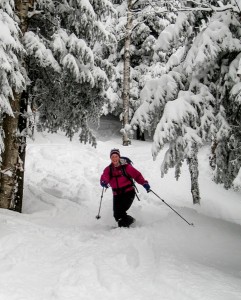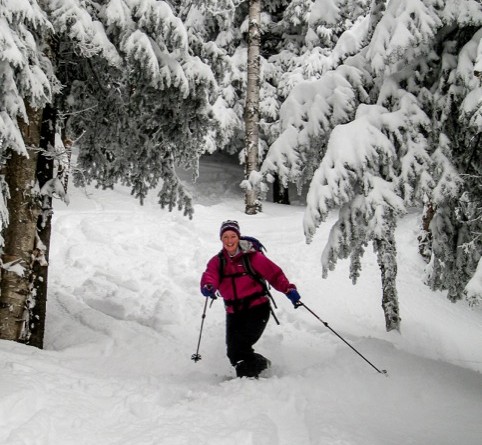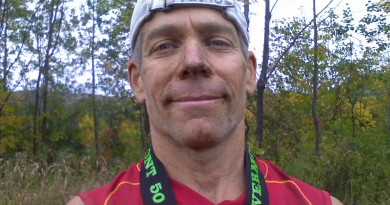Elisa Vandervort | Reader Athlete November 2012

Age: 39
Residence: Middlesex
Family: Husband, Barry Goodman
Occupation: Nurse practitioner
Primary sports: Backcountry skiing and cycle touring
Elisa Vandervort is happiest when she’s out in the woods, skiing on little-traveled backcountry terrain. She’s dedicated enough to spend part of her fall helping to make those trails navigable, and when she’s done with that volunteer work, she heads out to developing nations to help local women fight against cervical cancer.
VS: What is the allure of backcountry skiing?
EV: I love just being out in the woods. I grew up in Saskatoon, and my primary sport was rowing, but winters are so long in Canada that you spend a lot of time doing dry-land training. Cross-country skiing was good cross-training so we did that on weekends and in the evening. It was a wonderful place to grow up, and it instilled in me a deep love of winter, although I have to admit I don’t miss the -40 degree temperatures. Later, I worked as an experiential educator and led backpacking trips. I just love the quiet of the woods.
VS: Where do you like to ski?
EV: We’re so lucky here in Vermont to have so many great places, but I have to say that 80 percent of my time is in the Bolton backcountry. You can start out on regular trails and then get way off the beaten track. We also enjoy skiing the Mount Mansfield backcountry trails. I started out as a cross-country skier so the uphill has never been a problem for me, but I had to learn to tele-ski and negotiate the downhills. It’s really fun to learn new skills; there’s a thrill to not being good at something and then figuring it out. We’re lucky here in Vermont to have so many good and generous skiers who are willing to share their time and expertise.
VS: I understand you’re involved in the Vermont Land Trust effort to save Bolton Valley. Can you tell us about that?
EV: It’s been an interesting process. It’s pretty amazing how far we’ve come in a short period of time. It was about a year ago that Ann Gotham, a nurse practitioner and a volunteer patroller at Bolton, first learned that the land was going to be sold, and she mobilized the skiing community. The Vermont Land Trust stepped in to purchase the property for $1.6 million. They got some grants and many individuals and organizations have stepped forward to donate money, but they don’t have the full amount yet. It’s been very exciting, and it’s a big relief in terms of hopefully preserving a tract of land that is so important in terms of community, wildlife and the history of skiing here in Vermont.
VS: Are you one of the people who does volunteer trail clearing at Bolton?
EV: I’m a Catamount, which is what they call the younger members of the Old Goats. I’ve been doing it since 2000. My seasons are marked with time in the woods with people like Clem Holden and Herm Hoffman. Some of those guys are getting older, so I’ve learned how to carry Clem’s chain saw. It’s been a lovely way to get to know other folks and build community and give back in some small way since we spend so much time using the resort. I worry sometimes because it’s an older crowd, and we need more young people to carry on the tradition.
VS: Tell me about your bicycle touring?
EV: We’re really two season people. In the winter, we’re out on skis, but as soon as mud season is over, we’re on our bikes. We do some bike commuting, though not enough, but what we really like is to be out on the dirt roads. They’re quieter and more shaded, and they’re safer because there is less traffic. There are some lovely scenic routes. In addition, we like to do an annual four- to five-week bicycle tour with camping. We generally do about 1,000 miles. Our first trip was in the summer of 2000 along the mostly dirt Continental Divide Trail. It was an awesome trip without much traffic. We’ve done some touring in the Northwest and also in Chile and Argentina, and we’ve gone to Turkey twice. This year we spent five weeks in central Europe, starting in Venice and traveling through Slovenia, Hungary, Slovakia, and Austria. Bike touring is a wonderful way to travel, and it’s a little less insulated than other ways to get around. You’re outside every day. You might only be pedaling for six hours, but you’re still outside for eight to 10 hours, camping and meeting the local people and giving your language skills a workout.
VS: Can you talk about your work with Grounds for Health?
EV: I’ve been doing primary care as a family nurse practitioner for 10 years, but before that, I did some international work. Now I work part time with Grounds for Health, which is an international women’s health NGO that was founded 16 years ago by Daniel Cox of Coffee Enterprises. In visiting coffee producing countries, he discovered that cervical cancer killed women at a ridiculous rate. Grounds for Health started as a way to provide screening for cervical cancer in the form of Pap smears, but it has shifted to be more capacity-building. We are trying to create health care programs in these countries so we start with building relationships and then we train the doctors and nurses. We had to come up with an alternate to the Pap smear because it takes too long to determine the results. We’ve got a 5 percent vinegar acetic acid with which we paint the cervix so the results are instantaneous, and women can start getting treatment right away. We work in Tanzania, Nicaragua, and Peru, and I’m headed to Peru in October. When I’m not traveling with Grounds for Health, I worked at the People’s Health and Wellness Center in Barre treating people who are uninsured or underinsured. I also do some work at the Student Health Center at the University of Vermont. It’s a nice mix.


